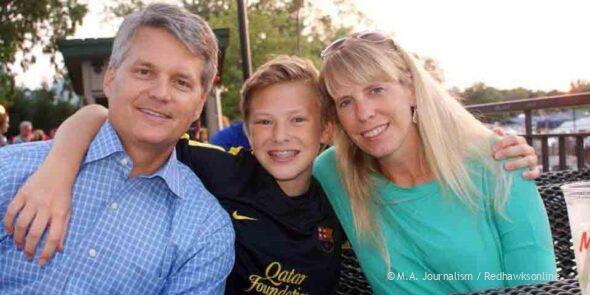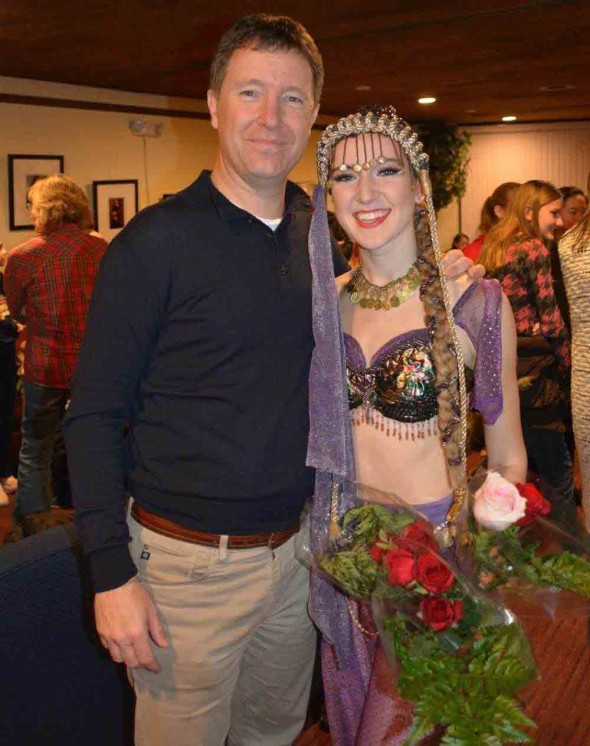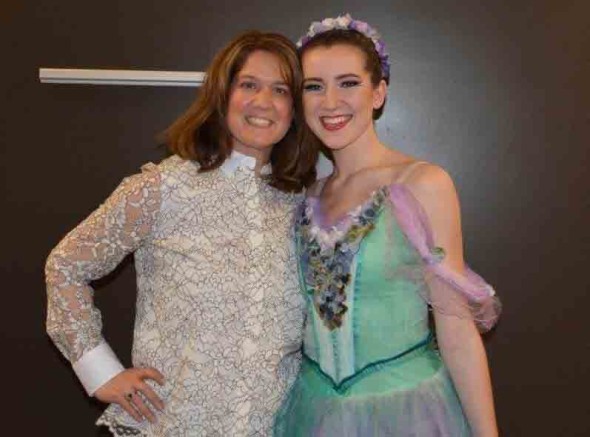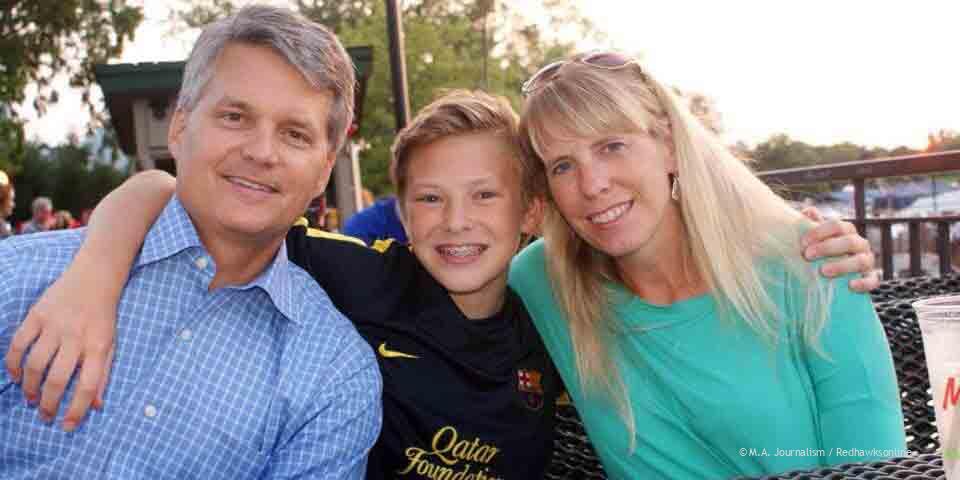First and Last : In the fifth installment, parents of high school students help nurture their children’s individual identities
“I want you to go with a leap of faith and try it,” Angie Askegaard told her son Lars one year ago. “Sometimes you have to trust your gut and your parents’ intuition.”
It was the spri ng break of Lars’ eighth grade year and he had been exploring the option of transferring schools for ninth grade.
ng break of Lars’ eighth grade year and he had been exploring the option of transferring schools for ninth grade.
While already registered for freshman courses at Eden Prairie High School, he was also researching the classes offered at Minnehaha Academy.
As an alumna, and already a mother and aunt of Minnehaha high schoolers, Angie had been actively supportive of her son’s interest in Minnehaha for many years.
“I knew to just expose him to it,” Angie said. “We showed him a lot of sporting events; we came to see the basketball team win at state, and I would always videotape the orchestra and go home and show it to him.”
The positive exposure to Minnehaha that Angie gradually built up for her son was a significant factor in Lars’ decision to transfer. It was also a parental strategy: a tactic to guide her son in the direction that was believed to be the wisest option.
Like Angie, all parents choose from multitudes of strategies when attempting to guide their children in what is deemed to be the right direction. Sometimes, these strategies fail and the parents are unable to direct their children to their desired extent. Other times, and not always recognized by the children, these strategies succeed and positive results derive from parental impact.
As parents help their teenagers enter into and exit out of high school, they gradually discover what really makes their children trust their guts enough to go with leaps of faith based on their parent’s intuition.
Jennifer and Preston McKenzie discovered a new aspect of parental influence this year, through the college application process of their senior daughter Bailey.
Preston explained that their roles as parents were to expose Bailey to her options and then support her to make her own  decision. “Our job is to help her understand what the possibilities are,” Preston said.
decision. “Our job is to help her understand what the possibilities are,” Preston said.
Bailey’s exposure to the possibilities began in her junior year when her parents suggested specific universities and possible regions of the country to school in. The discussion extended into Bailey’s senior year when the McKenzie’s specified the perimeters of Bailey’s decisions, in terms of finances and distance away.
Then with the help of College and Guidance Counselor Lauren Bae, Bailey respected these perimeters and formed a personal list of colleges she was interested in.
It was the responsibility of her parents to travel with her and visit the colleges on her list. They visited St. Thomas University, the University of Minnesota, and Elon University this past summer. More recently, Bailey visited Arizona State University with her mother over spring break and she also spent a weekend in Colorado with her dad, visiting Colorado State University and the University of Colorado Boulder.
With these college visits and through extensive discussions with their daughter about her options, the McKenzie’s felt adequately involved in Bailey’s college decision process.
“Most importantly, we’re just a sounding board. This decision is her decision,” Preston said.
“There are a lot of things now that we just can’t do for her,” Jennifer said, explaining the importance of Bailey’s independence in the process. “[We] really just want her to be excited about the school [she chooses] because that will make a better chance of liking the school, making her feel like it was her decision and not us leading her to a decision.”
By allowing Bailey to individually finalize the list of colleges to apply to and officially commit to a specific university, the McKenzie’s display another form of parental strategy. Due in large part to a personality trait that Bailey’s had since she was a toddler, Jennifer and Preston have learned to give Bail ey space and freedom to make decisions on her own.
ey space and freedom to make decisions on her own.
“She won’t be living at home anymore and you don’t want her to be making decisions or planning her schedule or taking responsibilities for the first time when you’re a thousand miles away,” Preston said. “Her mom is very good at [giving Bailey freedom] and I’ve gotten better at it. It works well for Bailey because she’s always been a very independent person.”
Preston continued, recalling a memory of Bailey that exemplified her independence at an early age.
“Jennifer and I were in the car and Bailey was in the back, in a car seat. She was being very quiet and we were talking and navigating. All of a sudden, we heard [something] from the backseat, from a kid who had never uttered a phrase before. Her first phrase was “I did it.” She had taken off both of her shoes and both of her socks while sitting in the car seat. She must’ve been back there working on that for fifteen minutes,” Preston said with a chuckle.
With the knowledge of this significant trait about his daughter, Preston learned to be patient with Bailey’s thought process and to “Help her reach a conclusion, rather than reach a conclusion for her.”
Thus, the McKenzie’s are still picking up on effective ways to influence Bailey, based on specific personality traits that her sisters don’t display.
Similarly, Angie and her husband Eric discovered early on that Lars was intensely intrigued by the mechanics and the depths of various objects and ideas.
“He’s always been really inquisitive and a very good conversationalist, and he’s always been a very curious learner,” Angie said. “In elementary school he stopped the custodian and asked the make of the vacuum and wanted to know how it worked. He always [asks] the next level of question that fuels his enthusiasm for the next question, and you can almost see his little wheels spinning,” she said with a smile.
In recognition of their son’s curiousness, Angie and Eric altered a few aspects of their parenting and of their schedules.
“We remodeled our house when he was about five and I would just set up a lawn chair and give him a bowl of popcorn and he’d sit: he was like the general contractor, overseeing it all,” Angie said. She continued, “I had to stop and take time to allow him to explore things. We would do silly things like park in front of a construction lot so that he could watch how everything worked.”
Lars’ great fascination with science was very apparent to his father, whose occupation a few years ago was to run the manufacturing operations for a company that made computer chips. As a young child, Lars would beg to come into work with his father to see the machines and the robots and all things mechanical. Eric saw the wheels spinning Lars’ mind.
“Making computer chips involves chemistry, cryogenics, robotics, electricity, electronics, hydraulics, pneumatics, software, and all kinds of science to either make the chips or make the machines that made the chips. So Lars came to understand at a very young age that there are many kinds of sciences in the world, and that many are needed and have to work together to make successful productions,” Eric said.
“I think these visits to my work opened his eyes up to a lot of possibilities in the fields of science, technology, engineering and math.”
Angie explores the double-sided influence she has on her son, explaining that “You have to look at what gifts your kids have and help them to develop them,” while also, “sometimes you have to expose your kids to something [new] they can try.”
As a parent who stopped at construction sites to quench her son’s intense thirst for knowledge, Angie is a mother who let her son’s distinct characteristics to influence her and her schedule. Also, as a mom who subtlety but persistently guided her son into transferring to Minnehaha, Angie is a mom who let her own intuition influence her son and his situation.
Thus, Angie is a mom who faces a multitude of parental strategies and who, like all mothers, must find the extent of influence on her child that is most effective. For some parents, it’s about taking out a lawn chair and a bowl of popcorn for their son to oversee a construction site. For others, it’s about giving their daughter fifteen minutes to herself in the back seat of the car to take off her shoes by herself.

